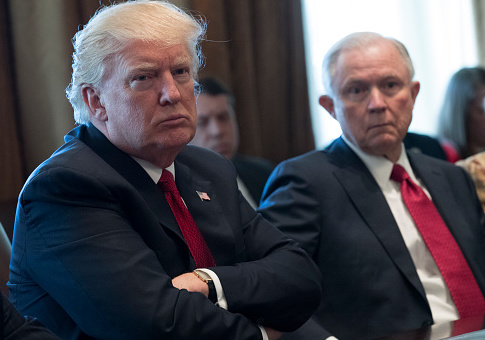President Donald Trump insulted and demanded the resignation of Attorney General Jeff Sessions after learning of the appointment of special counsel Robert Mueller, according to a new report.
In response to an Oval Office tirade in May, the attorney general offered the president a letter of resignation, the New York Times reported. It took the lobbying of several close advisers to stop Trump from accepting it.
On May 17, Trump was in an Oval Office meeting to discuss the replacement of fired FBI Director James Comey. The attorney general was present, along with Vice President Mike Pence and White House Counsel Don McGahn.
Midway through the meeting, McGahn took a phone call from Deputy Attorney General Rod Rosenstein. The deputy attorney general had been responsible for overseeing the investigation into Russian interference in the 2016 election since Sessions had recused himself from the role. Rosenstein informed McGahn that, bowing to Congressional pressure, he had opted to appoint Mueller special counsel. McGahn hung up, and told Trump.
Trump immediately lit into his attorney general, calling Sessions an "idiot," telling him that appointing him attorney general was one of the worst decisions he had made, and telling him to resign. Sessions, according to accounts from administration officials, was visibly shaken, and told Trump that he would resign. He sent Trump a brief letter of resignation shortly thereafter.
Before Trump could accept Sessions's resignation, however, several top advisers pushed back against the move. Pence, then White House chief strategist Steve Bannon, and then White House chief of staff Reince Priebus all told Trump that to accept the resignation would only add to the turmoil within the administration. It would also bring Sessions' former congressional colleagues to his aid, as he previously served as a senator from Alabama for twenty years.
Politico first reported in July that the attorney general once submitted a letter or resignation, but the circumstances surrounding that submission were previously unclear.
While Trump did not fire the former senator, he did continue to attack him in the press and on Twitter. In July, Trump told the Times he would not have appointed Sessions had he known the attorney general would recuse himself. He also blasted Sessions in a number of tweets, calling him "beleaguered" and saying his position on Hillary Clinton's email misuse was "weak."
Trump's attack on Sessions represents a 180 degree turn in their relationship from the days of the 2016 campaign. Sessions was the first sitting senator to endorse Trump in the 2016 Republican primary.
